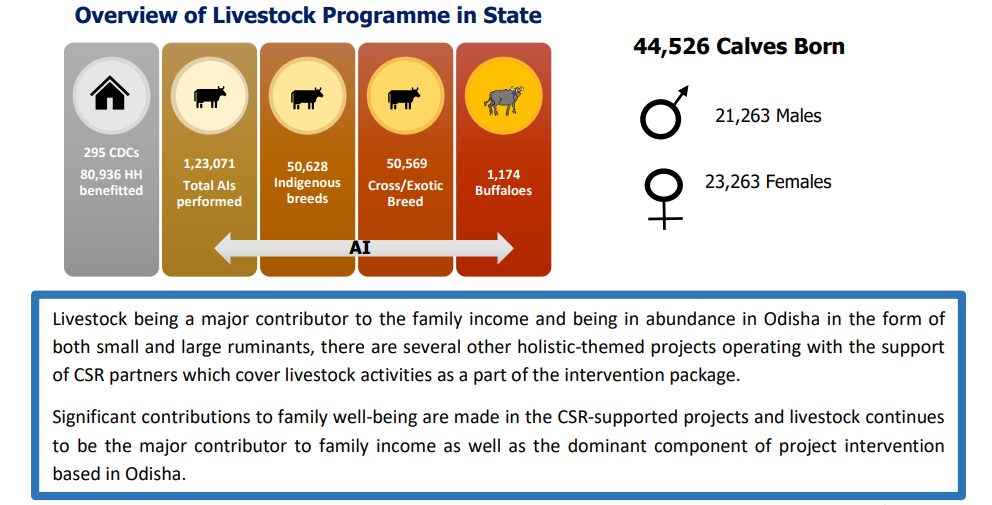Livestock-based Livelihoods and Enteric Methane Emissions Reduction
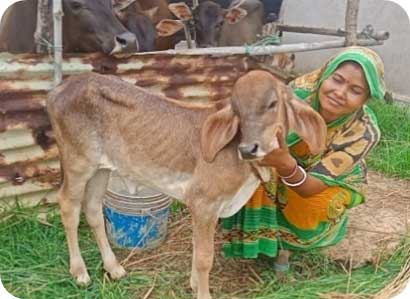
Livestock-based livelihoods play a crucial role in rural communities, providing income and food security. They encompass various activities such as rearing cattle, buffaloes, goats and poultry. These livelihoods not only contribute to household income but also serve as a source of employment and economic development. Integrated approaches that focus on breeding, nutrition, health and management are implemented to enhance productivity and sustainability. Livestock-based livelihood programmess often provide training, access to veterinary services and support for market linkages, empowering individuals and communities to thrive. Door-step services are provided through the network of Livestock / Cattle Development Centres (CDCs) managed by trained para veterinarians. By promoting the development of livestock-based livelihoods, rural areas can achieve improved livelihoods, poverty reduction and overall rural development. Major projects implemented in the State under this thematic component are outlined below.
Training of Youth and Scaling up Bovine Breeding Services through Establishment of Multipurpose AI Technicians in Rural India (MAITRI)
- Sponsor: Odisha Livestock Resources Development Society
Key achievements:The project aims to empower local rural youth with skill development to provide self sustainable breeding and allied services at farmers' doorstep. A holistic approach has been followed to integrate skill development with livelihoods and quality service delivery, fostering breed improvement and propelling dairy sector development. So far 30 days classroom training of 1,104 candidates and 60 days field training of 800 candidates have been carried out. 1,456 MAITRI candidates have been selected out of 1,500 post of MAITRI candidates from all the districts. Training sessions were undertaken in accredited institutes – Animal Husbandry Staff Training Institute & Extension Training Centre (AHDSTI & ETC), Bhanjanagar and Livestock Inspector Training Centre (LITC).
Artificial Insemination Programme (AIP)
- Sponsor: Odisha Livestock Resources Development Society (OLRDS)
Key achievements:The programme is in continuation to ILDP and is being implemented in convergence with NAIP. BAIF has been entrusted with supervision and monitoring of the programme. Existing 285 centres have been operationalised under the new programme. The programme has been successfully completed in December 2022 with total of 1,00,126 AIs reported. The year recorded over 0.99 lac AIs. Of the 45,932 cases followed up, an encouraging conception rate of 49.95% has been recorded. 4,570 calf births have been reported during the year. The top 3 districts in terms of district wise total AIs are Puri, Balangir and Nabrangpur districts. All the AI is recorded in Information Network for Animal Productivity and Health (INAPH). Promotion of indigenous breeds has been pursued.
AI in different Districts
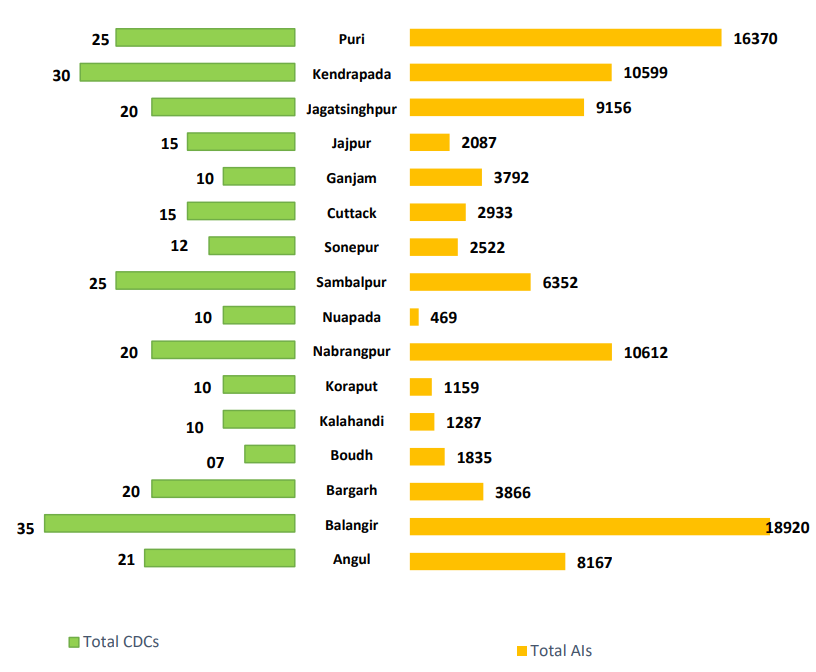
Breed-wise Insemination*
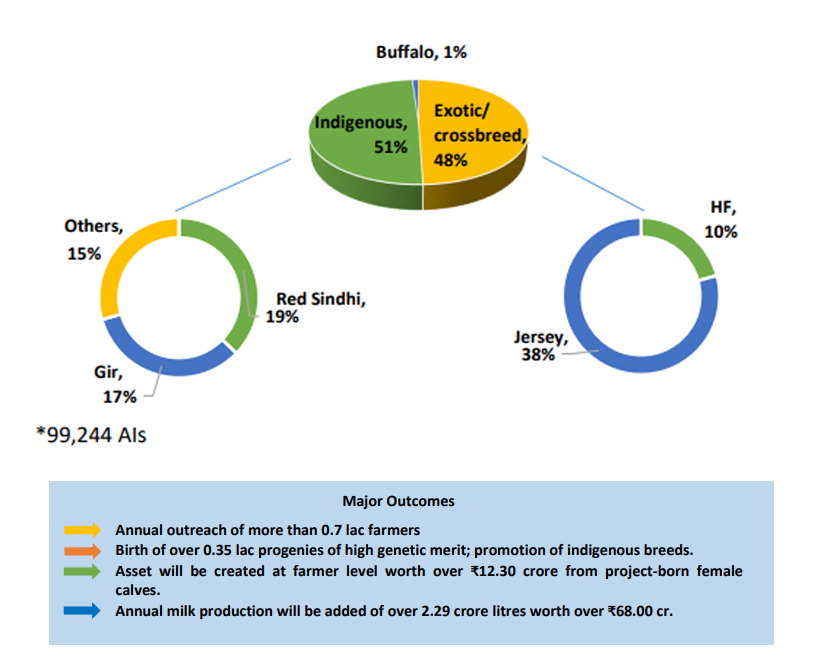
Livestock Development Programme
- Sponsor: Adani Foundation
Key achievements:The project is being implemented in the peripheral area of Dhamra port in the Chandbali block of Bhadrak district, Odisha. Beginning with two Livestock Development Centres, four more were added subsequently. The project has been extended during the year to Chhattisgarh with two CDCs at Raipur and Raigarh districts. The overall objective of the project is to augment the livelihoods of households in the cluster through sustainable initiatives related to dairy husbandry. During the year, a total of 2,436 artificial inseminations have been performed, comprising of the usage of 1,321 and 1,115 regular and sex sorted semen respectively. With a focus on green fodder availability, 137 demonstrations covering perennial and seasonal fodder have been undertaken.
Access to quality breeding
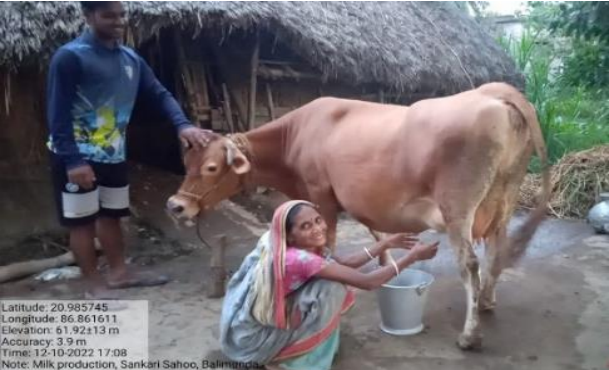 Smt. Sankari Sahoo is a resident of Balimunda village of Bhadrak district, Odisha. She started livestock rearing in 2010 with 2 cows which were nondescript. Milk production was around 2-3 litres per day. After becoming acquainted with the project initiative, she expressed her interest in technical support and services from BAIF. Regular hand holding training helped augment knowledge, skills, Access to quality breedingconfidence and assets. Presently, she has 4 cows of improved breed. After recieving technical support from BAIF team, the milk production enhanced to 15 litres per day and increase in monthly income of ₹9,000 to 10,000. Smt. Sahoo has been provided with a platform where she can acquire improved practices, raise queries to reach solutions and see successful implementation of acquired knowledge and practices on field. She had also started green fodder cultivation like hybrid Napier, Berseem, Oats etc on her 1 acre of land to enhance milk productivity and also uses BAIF mineral mixture regularly. With the support of BAIF and Adani Foundation under Livestock Development Programme, she has been able to build dairy as a profitable enterprise.
Smt. Sankari Sahoo is a resident of Balimunda village of Bhadrak district, Odisha. She started livestock rearing in 2010 with 2 cows which were nondescript. Milk production was around 2-3 litres per day. After becoming acquainted with the project initiative, she expressed her interest in technical support and services from BAIF. Regular hand holding training helped augment knowledge, skills, Access to quality breedingconfidence and assets. Presently, she has 4 cows of improved breed. After recieving technical support from BAIF team, the milk production enhanced to 15 litres per day and increase in monthly income of ₹9,000 to 10,000. Smt. Sahoo has been provided with a platform where she can acquire improved practices, raise queries to reach solutions and see successful implementation of acquired knowledge and practices on field. She had also started green fodder cultivation like hybrid Napier, Berseem, Oats etc on her 1 acre of land to enhance milk productivity and also uses BAIF mineral mixture regularly. With the support of BAIF and Adani Foundation under Livestock Development Programme, she has been able to build dairy as a profitable enterprise.
Enhanced Genetics Project (EGP)
- Sponsor: Bill & Melinda Gates Foundation
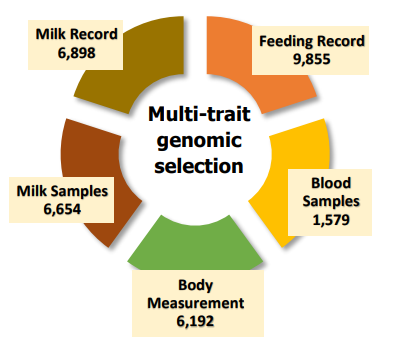 Key achievements:The project focuses on several key activities to achieve its objectives in the livestock sector. These activities encompass milk sample collection, milk testing, body measurement, feeding practices and blood collection programmes, conducted with the objectives of understanding the genotype - environment interaction, establishing a platform for genomic selection among crossbreds, implementing a multi-breed and multi-trait genomic selection programme for cattle and buffaloes, evolving a farmer feedback system, demonstrating and implementing a business model and sourcing potential bull calves for semen production.
Key achievements:The project focuses on several key activities to achieve its objectives in the livestock sector. These activities encompass milk sample collection, milk testing, body measurement, feeding practices and blood collection programmes, conducted with the objectives of understanding the genotype - environment interaction, establishing a platform for genomic selection among crossbreds, implementing a multi-breed and multi-trait genomic selection programme for cattle and buffaloes, evolving a farmer feedback system, demonstrating and implementing a business model and sourcing potential bull calves for semen production.
through these activities, the project aims to gather data, improve genetic selection, involve farmers in the feedback process and showcase a sustainable business model in the livestock sector.
Goat Artificial Insemination Programme
- Sponsor: Tata-Cornell Institute
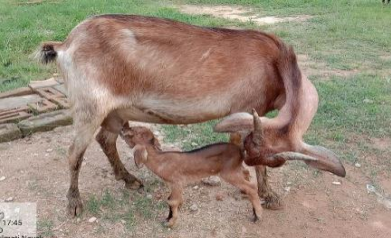 Key achievements:The goat AI programme aims to enhance breeding practices by utilizing artificial insemination technique in goats. It focusses on improving genetic traits, increasing productivity and promoting better flock management in goat farming. The research-based programme focussed on four villages in Angul block. Major activities undertaken are given below:
Key achievements:The goat AI programme aims to enhance breeding practices by utilizing artificial insemination technique in goats. It focusses on improving genetic traits, increasing productivity and promoting better flock management in goat farming. The research-based programme focussed on four villages in Angul block. Major activities undertaken are given below:
- During the initial phase of the project, a baseline study was conducted to gather scientific data on goats and kids
- Covered over 5,000 animals through tagging, deworming, vaccination, mineral mixture support and castration initiatives.
Godaan
- Sponsor: Atul Foundation
Key achievements:Meaningful induction of milching cattle covered 8 households in the project village of Muribahal Block of Balangir district with the objective of providing sustainable self-employment to 125 needy families through animal husbandry while encompassing activities such as cattle induction, implementation of the Sex sorted AI, fodder cultivation, training. This comprehensive approach ensures an integrated focus on improving breeding practices, sustainable agriculture, fodder supply and community development.
- During the year, 28 tribal families benefitted from the project, improving their livelihoods and enhancing their overall well-being.
- Milk collection in the village increased tenfold, ensuring greater productivity and income for the local community.
- Adoption of scientific livestock management practices by participant families.
Breeding Bull Production through Assisted Reproductive Techniques and Genomic Evaluation
- Sponsor: Directorate of Animal Husbandry & Veterinary Services, Govt. of Odisha
Key achievements:Project deliverable shall be the availability of 68 breeding bulls by 2025-26 through a combination of different assisted productive and latest breeding technique such as genomic evaluation.Demonstrated commitment to enhancing cattle breeding by introducing superior genetics through embryo transfer technology, contributing to the improvement of dairy farming in the region and supporting the state efforts of the Government of Odisha in livestock development.
With the technical support of BAIF, the demonstration of first-time embryo transfer technology has been successfully conducted at Sambalpur and Cuttack government farms, marking a significant milestone in agricultural innovation.
Facilitating Non-Governmental Organization (FNGO)
- Sponsor: Directorate of Animal Husbandry & Veterinary Services, Government of Odisha
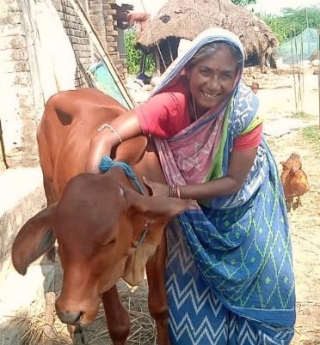 Key achievements:The project involved the engagement of 52 programme assistants to strengthen the implementation of Animal Husbandry and veterinary schemes and services at the block level, ensuring enhanced support and sustainable development for rural communities.
Key achievements:The project involved the engagement of 52 programme assistants to strengthen the implementation of Animal Husbandry and veterinary schemes and services at the block level, ensuring enhanced support and sustainable development for rural communities.
